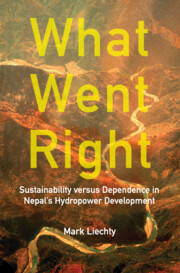'This book tells a remarkable story of the growth of local hydro power development in Nepal. It formally starts in 1963 with an agreement between the Nepal government and a Christian organization, the United Mission to Nepal, for the establishment of the Institute of Technology and Industrial Development in Butwal. The driving force in this was Odd Hoftun, an experienced applied engineer from Norway. It was a time when development economists were discussing the pros and cons of quick turn key infrastructural projects with external consultants, etc. or go a slower route and build a local engineering capability to construct and manage institutions in the hydro power sector. Odd Hoftun and Nepali colleagues persisted with the second route and this book tells what happened from the early days to the present time. The book focuses on the story of the private construction company, the Butwal Power Company, which emerged from the early initiatives. This history includes public and private take overs, major changes in government policy, local and foreign investors and much, much more. What went right tells this story in careful detail and shows the influence of BPC on Nepal’s current hydro sector. The book is a “page turner” as Liechty takes us from one set of major events in construction and politics to the next … and the influence of BPC’s legacy is still unfolding in major ways.'
Stephen Biggs - SOAS University of London
'Nepal's hydropower sector has been a flame that has, over the last seven decades, both illuminated her development space and attracted exuberant moths (national and international) to their doom. In this book, Leichty describes the success of a remarkably innovative moth whose story has not been properly told before. It is that of an alternative pathway whose relevance has only grown as the conventional development landscape faces the end of the Age of Aid and the rise of one of Climate Change Concerns. It must be read, not just by Nepali hydrocrats but by all development professionals in international agencies as well.'
Dipak Gyawali - Academician, Nepal Academy of Science and Technology & Former Minister of Water Resources of Nepal
'Prof. Liechty skillfully tells the inspirational story of alternative development of hydropower infrastructure in Nepal. Over the course of five decades Odd Hoftun and Balaram Pradhan did not just build power projects, through the Butwal Power Company, but laid the foundation for a vibrant domestic power sector in Nepal with thousands of competent engineers and technicians, over a hundred active Independent Power Producers, and dozens of construction and manufacturing companies and engineering consultancy firms. This book is a must read for development practitioners and aid agencies interested in critically examining how to get the best returns from international development assistance.'
Bikash Pandey - Director Clean Energy, Winrock International, USA
'If asked, most of us would likely explain Nepal’s many development challenges as stemming from its status as a flailing minnow sandwiched between the behemoths India and China; as an enduring Shangri-La mired in its ancient cultural and familial heritage; or as the inexorable legacy of harsh colonial imposition and contemporary neoliberal hubris. What Went Right provides a more nuanced and compelling alternative: Nepalis have long sought enhanced well-being, but on their own terms and by finding locally legitimate solutions to their particular development problems, especially as it pertains to harnessing energy from water. Mark Liechty carefully highlights how difficult, fraught, and contingent such a strategy is, and how long it takes to fully consolidate itself, but in so doing demonstrates how respectful partnerships, dogged persistence, and sustained grassroots improvisation can succeed where so many other top-down technical approaches have stumbled.'
Michael Woolcock - World Bank and Harvard University




